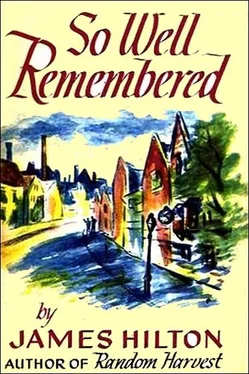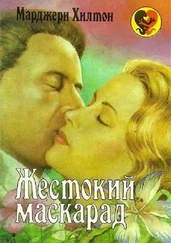Джеймс Хилтон - So Well Remembered
Здесь есть возможность читать онлайн «Джеймс Хилтон - So Well Remembered» весь текст электронной книги совершенно бесплатно (целиком полную версию без сокращений). В некоторых случаях можно слушать аудио, скачать через торрент в формате fb2 и присутствует краткое содержание. Год выпуска: 1945, Жанр: Проза, на английском языке. Описание произведения, (предисловие) а так же отзывы посетителей доступны на портале библиотеки ЛибКат.
- Название:So Well Remembered
- Автор:
- Жанр:
- Год:1945
- ISBN:нет данных
- Рейтинг книги:5 / 5. Голосов: 1
-
Избранное:Добавить в избранное
- Отзывы:
-
Ваша оценка:
- 100
- 1
- 2
- 3
- 4
- 5
So Well Remembered: краткое содержание, описание и аннотация
Предлагаем к чтению аннотацию, описание, краткое содержание или предисловие (зависит от того, что написал сам автор книги «So Well Remembered»). Если вы не нашли необходимую информацию о книге — напишите в комментариях, мы постараемся отыскать её.
So Well Remembered — читать онлайн бесплатно полную книгу (весь текст) целиком
Ниже представлен текст книги, разбитый по страницам. Система сохранения места последней прочитанной страницы, позволяет с удобством читать онлайн бесплатно книгу «So Well Remembered», без необходимости каждый раз заново искать на чём Вы остановились. Поставьте закладку, и сможете в любой момент перейти на страницу, на которой закончили чтение.
Интервал:
Закладка:
“You look at it very coldly,” she said.
“I look at it very logically,” I answered. “The whole incident, affair, or whatever you call it, is closed now and can’t be reopened unless some totally new item of evidence should crop up. And that’s so unlikely that we can almost say it won’t happen.”
She then said quietly: “It can happen. That’s what I came here for— to tell you something. It was I who intercepted the cable. I decoded it, found out what it meant, then decided that Jeffrey shouldn’t ever see it. Of course he doesn’t know I did that, or that I’m admitting it now to you.”
She waited for me to show surprise, and perhaps I did, but it was not surprise at what she said so much as surprise that she should expect me to believe it. Naturally I didn’t. But it would have been equally unwise to dismiss the matter without further probing.
“What made you do such a thing?” I asked guardedly.
“I just had to,” she answered. “The telegraph line was cut, so I knew he’d want to take the message himself, and as the country was in the hands of the rebels I didn’t think he’d have much chance of getting through. And he might have got killed.”
“He might,” I agreed. “And five others did.”
She said nothing.
“Probably as a result of the message not being delivered.”
“I wouldn’t say PROBABLY. POSSIBLY.”
“You knew the planters and their families were in danger when you intercepted the message?”
“Yes.”
“And you deliberately let them take their chance in order to ensure your husband’s personal safety?”
“Yes.”
“Don’t you think that rather indefensible?”
“I’m not defending it. I’m just saying it’s what I did. My husband was dearer to me than a crowd of people I didn’t know.”
“How many people would you be willing to sacrifice for such a reason?”
She didn’t answer.
I went on, with more sarcasm: “Or shall I put it this way—at what point would the lives of strangers, by sheer weight of numbers, tilt the balance against the life of the man you love?”
She answered: “Never.”
“So you’d sacrifice millions, if one can conceive of such a situation?”
She nodded.
She really was at this point beginning to surprise me. It’s rare that people, especially women, are willing to let a logical point be pressed home. I said, rather severely: “I’m glad to think you are probably unique in looking at things that way.”
“Oh, but I’m not,” she answered. “In war-time wouldn’t you press a button, if you could, to destroy a million of the enemy rather than lose a single life on your side?”
“But this wasn’t war-time.”
“When you love somebody it’s always war-time.”
“When YOU love somebody, maybe.”
She nodded. “Then why is my attitude so extraordinary?”
What WAS extraordinary, of course, was her argument, and it was one that didn’t seem to me profitable to continue. I was still disinclined to believe her confession, but I was clear in my mind as to the implications of the alternatives. Either she was lying to save her husband’s reputation— in which case one could possibly like her for it; or she had actually told the truth—in which case she was ruthless, unprincipled, and wholly the kind of wife whom a man in a responsible position should not have.
But in any case nothing could be done. Even if her confession were accepted at its face value it would not help Jeffrey to get his job back. The most it could do would be to win him a measure of half- incredulous sympathy.
I explained all this to her, and it seemed to me that she picked up the cue, as it were, and from then on made a bid for the sympathy. Jeffrey, she repeated, was on the verge of a breakdown. All he asked was some job, however small and ill-paid, just to give him the feeling—perhaps even the illusion—that he had not been dishonourably discharged. It had even come to the point, she said, that their marriage might founder if he could not get such a job; he was finding it hard to settle down in Ireland, and the book he was trying to write was not going well. This was the first I had heard about another book and I asked her for details. She said it was a book about the Far East—one he had long projected—something rather scholarly and definitive. She had been urging him to use up his time that way ever since he came home, and surely conditions in Ireland were ideal for authorship—a quiet place in the country, nothing else to do, and ample money to live on. “Really,” she added, “he’s quite well off— there’s no reason why he should worry about a career, or about writing books either, so far as that goes. The whole Kemalpan business wouldn’t matter if only he didn’t think it mattered.”
“Perhaps, though, the relatives of the people who were killed there might still think it mattered.”
“Oh, THEM. I wasn’t thinking about THEM.”
And she wasn’t. She was just thinking of herself and Jeffrey. That seemed to close the argument quite finally. I got up and made it clear that there was nothing more I could say or do.
During the next few weeks I found myself thinking even more compellingly about the Winslows. First, HE had interested me, then she; but now my interest in each of them separately was more than redoubled in them both. What went on between such a pair? What sort of thing was their life together? If she had been lying on his behalf, it was possible that the appalling selfishness of her argument might not have been sincere. Or had she been telling the truth, both as to fact and attitude? To summarize it another way: if she were a liar, one liked her better and her husband less; but if she were not a liar, one disliked her intensely and felt sympathy for her husband. And I still could not properly make up my mind. I have rarely been so puzzled about anything. Then suddenly more evidence filtered through —I needn’t go into details, but it was of a kind that weighed down one of the scales pretty conclusively. She HAD told the truth. She HAD intercepted the message. Which meant that Jeffrey himself was neither a liar nor a coward, but at worst a victim.
The revelation swung me into a mood in which I recollected our meeting and how much, from first appearance, I had liked him. I remembered his quietness, his austere dignity, the simple unassumingness which, I knew, concealed a mind whose quality had been demonstrated. So on impulse I wrote him a friendly letter, saying nothing much except that I hoped he was getting on all right and that if he ever visited London he might find time to have lunch with me. To my surprise he answered by return and took the invitation with far more seriousness than I should have thought. He would have been so glad, he said, to come to London and see me (I hadn’t suggested that, by any means), but he was not very well and couldn’t get away… would I, however, visit him in Ireland—stay a week or two—there was good shooting, fishing, climbing, if that sort of thing appealed to me? He would be very happy, and please make it soon, because the late summer (and it was then August) was perhaps the best time of the year at Carrigole.
It happened that I had not had a holiday that year, and though the idea of visiting the Winslows seemed quite fantastic at first, I soon found myself thinking of reasons why I might take Jeffrey at his word. After all, I liked him; it might even be that if he were feeling low-spirited I could help him by talk and companionship. But I will not disguise that my overmastering motive was sheer curiosity. I wanted to find out what sort of people they both were, in their own home and with their own domestic problems. And at least it could do no harm to call on them if I happened to be holiday-making thereabouts.
Читать дальшеИнтервал:
Закладка:
Похожие книги на «So Well Remembered»
Представляем Вашему вниманию похожие книги на «So Well Remembered» списком для выбора. Мы отобрали схожую по названию и смыслу литературу в надежде предоставить читателям больше вариантов отыскать новые, интересные, ещё непрочитанные произведения.
Обсуждение, отзывы о книге «So Well Remembered» и просто собственные мнения читателей. Оставьте ваши комментарии, напишите, что Вы думаете о произведении, его смысле или главных героях. Укажите что конкретно понравилось, а что нет, и почему Вы так считаете.










